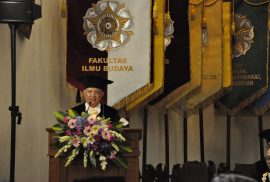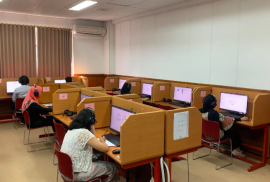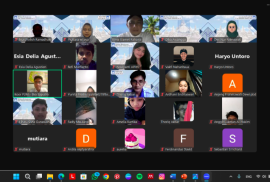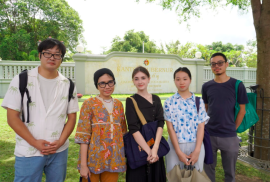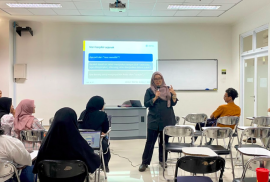Yogyakarta, 29/4/2025 — The Faculty of Cultural Sciences, Universitas Gadjah Mada (FIB UGM), officially inaugurated Prof. Dr. Aprinus Salam, M.Hum. as a Full Professor in the field of Literary Sociology. The inauguration ceremony took place at the UGM Senate Hall and was attended by family members, academic colleagues, and guests from various institutions.
In his inaugural speech titled “Literature, SARA, and the Politics of Misunderstanding”, Prof. Aprinus delivered a critical reflection on the role of literary works in Indonesia’s social and political dynamics. According to him, literature is one of the procedures through which truth is sought—whether by revealing it openly or by not revealing it at all. Literature, he argued, is not merely a work of art, but a human endeavour to explore and assert what is true and what remains questionable.
He further emphasised that the state should function to ensure a life that is more prosperous, just, secure, and peaceful for all its citizens. Therefore, society—including state institutions and civil society activists—must work together to foster intelligence and wisdom in nationhood and statehood.
Prof. Aprinus also criticised the limitations imposed on literary expression, especially regarding issues deemed sensitive such as ethnicity, religion, race, and intergroup relations (SARA). “It is time we allow literature to explore freely, without being shackled by fear or excessive censorship. No theme should be considered ‘forbidden’ to write about. It is precisely in those spaces that literature performs its function: to trace truths that have yet to be uncovered,” he stated.
This inauguration marks a significant milestone in the career of Prof. Aprinus Salam, who is widely known as a scholar, writer, and artist committed to raising issues of culture, literature, and diversity in Indonesian society. The event concluded with congratulatory remarks and hopes that Prof. Aprinus will continue to contribute to the strengthening of critical intellectual traditions and freedom of expression in both academic and public spheres.
[Public Relation Faculty of Cultural Sciences, Bulan Churniati]

